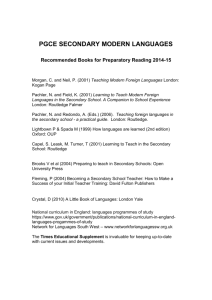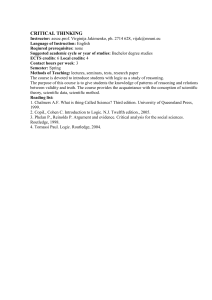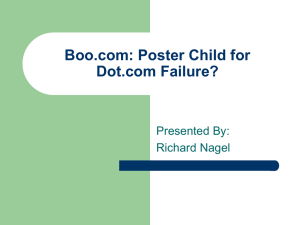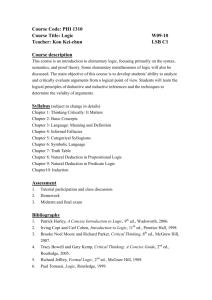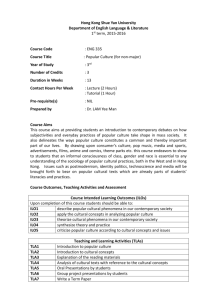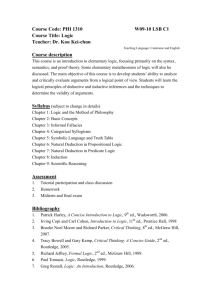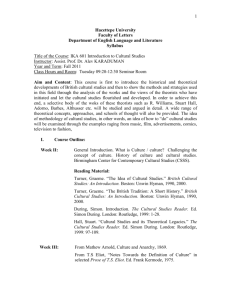CRP 1101 The Global City - AAP
advertisement
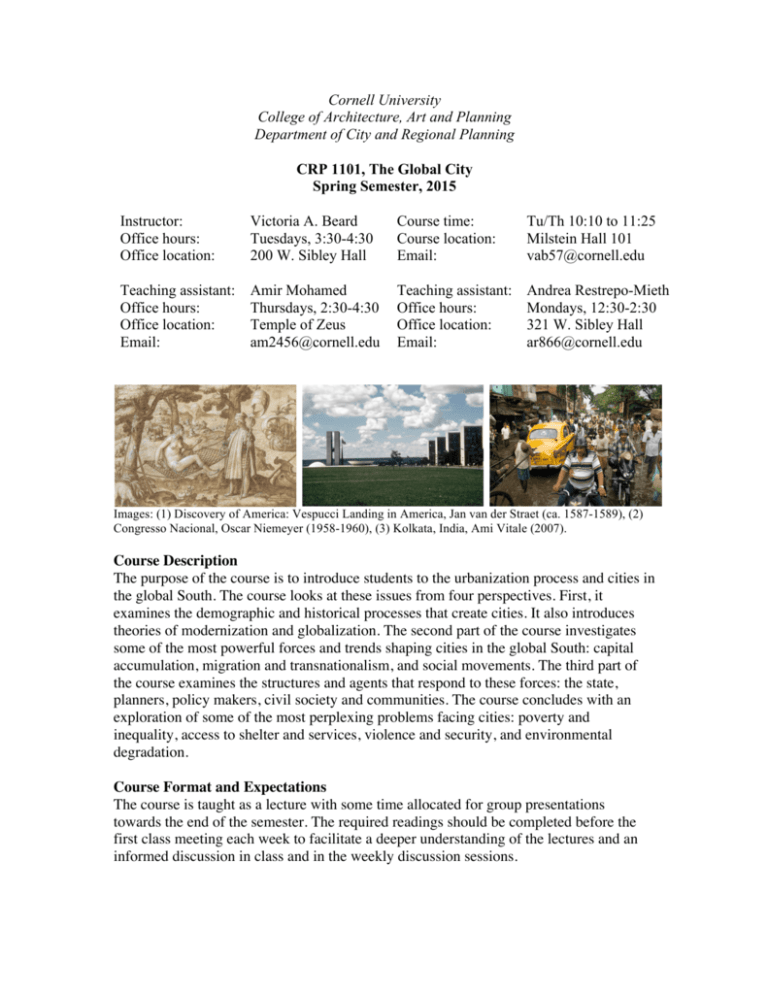
Cornell University College of Architecture, Art and Planning Department of City and Regional Planning CRP 1101, The Global City Spring Semester, 2015 Instructor: Office hours: Office location: Victoria A. Beard Tuesdays, 3:30-4:30 200 W. Sibley Hall Course time: Course location: Email: Tu/Th 10:10 to 11:25 Milstein Hall 101 vab57@cornell.edu Teaching assistant: Office hours: Office location: Email: Amir Mohamed Thursdays, 2:30-4:30 Temple of Zeus am2456@cornell.edu Teaching assistant: Office hours: Office location: Email: Andrea Restrepo-Mieth Mondays, 12:30-2:30 321 W. Sibley Hall ar866@cornell.edu Images: (1) Discovery of America: Vespucci Landing in America, Jan van der Straet (ca. 1587-1589), (2) Congresso Nacional, Oscar Niemeyer (1958-1960), (3) Kolkata, India, Ami Vitale (2007). Course Description The purpose of the course is to introduce students to the urbanization process and cities in the global South. The course looks at these issues from four perspectives. First, it examines the demographic and historical processes that create cities. It also introduces theories of modernization and globalization. The second part of the course investigates some of the most powerful forces and trends shaping cities in the global South: capital accumulation, migration and transnationalism, and social movements. The third part of the course examines the structures and agents that respond to these forces: the state, planners, policy makers, civil society and communities. The course concludes with an exploration of some of the most perplexing problems facing cities: poverty and inequality, access to shelter and services, violence and security, and environmental degradation. Course Format and Expectations The course is taught as a lecture with some time allocated for group presentations towards the end of the semester. The required readings should be completed before the first class meeting each week to facilitate a deeper understanding of the lectures and an informed discussion in class and in the weekly discussion sessions. Discussion Sessions The teaching assistants will lead weekly discussion sessions. These sessions are designed to help answer your questions and to provide a forum to probe topics more deeply. You should also use these sessions to obtain help with the research paper, the in-class presentation and the exams. Attendance is not required and you are welcome to attend any of the four sessions. All discussion sessions are on Fridays in W. Sibley Hall, room 115 from: 9:05 to 9:55, 10:10 to 11:00, 11:15 to 12:05 and 12:20 to 1:10. Learning Objectives Students will gain a broad understanding of cities and urbanization processes in the global South. Students will learn how to critically analyze the forces, structures and agents that build, manage, plan, govern and shape cities. In the last part of the course, students will interrogate some of the most pressing issues facing cities. Course assignments are designed to develop research, writing, presentation and critical thinking skills, as well as collaborative working skills. Required Readings and Course Materials There are two books required for the course. The books are available in paperback on Amazon.com: Boo, Katherine. 2012. Behind the Beautiful Forevers: Life, Death and Hope in a Mumbai Undercity. New York: Random House. Miraftab, Faranak and Neema Kudva. 2015. Cities of the Global South Reader. London: Routledge. Besides these two books, all other required readings are posted on Blackboard (http://blackboard.cornell.edu/). Evaluation and Grades Your grade is based on three areas of evaluation: (1) a midterm exam, (2) a research assignment, and (3) a final exam. Course Grade Areas of evaluation Midterm exam Research assignment Final exam Percentage of grade Date 30% Thursday, March 5th 30% Thursday, April 16th 40% TBD The midterm will be given in class on March 5th in week 7. The midterm and final exams will consist of multiple choice questions, short answers and essay responses. More detail about the format of the midterm and final exam will be provided in class and in the weekly discussions sessions. You will receive 3 grades for the research assignment: (1) 10% for your individual contribution to the group research paper, (2) 10% for the quality and overall cohesiveness of the group research paper, and (3) 10% for the quality of your group’s in-class presentation. 2 Description of the Research, Writing and Presentation Assignment You will work with a group of 4 students on a research paper about a city in the global South. The selection of your group’s city needs to be approved by the instructor. Each student will write an individual section of the paper, not to exceed 10 pages on a specific aspect of the course (i.e., historical perspective, planning, poverty, migration, governance, shelter). As a group you will write the introduction and conclusion of your paper. You are responsible for peer-editing each other’s sections to make sure that all the sections contribute to a cohesive whole. Part of your grade for this assignment (10%) is based on the overall quality of the final product. You should discuss an outline as well as other aspects of your paper with the teaching assistants during weekly discussion sessions and office hours. Additional information and guidance about the written assignment and the presentation will be provided in-class and during the weekly discussion sessions. Research reports are not to exceed 45 pages double-spaced, with one-inch margins, pages must be consecutively numbered and the report must be bound or stapled. Your reference list should follow APA citation style. During the semester your group will be asked to make a brief, in-class presentation. Resources It is recommended that you take a tour of the Cornell Library system, and you meet with a librarian to discuss your research topic. The teaching assistants are available to help you with your research topic as well as your writing. For additional help with writing, please take advantage of the Knight Institute and their walk-in service available on campus. A useful resource for questions about how to reference research materials is the Purdue University’s OWL (Online Writing Lab), https://owl.english.purdue.edu/owl/. Academic Integrity Each student in the course is expected to abide by the Cornell University Code of Academic Integrity. It is your responsibility to familiarize yourself with the code, (http://cuinfo.cornell.edu/Academic/AIC.html). Any work submitted by a student in the course should be the student’s own, original work. For this course, collaboration is allowed for group assignments as specified by the instructor and in the syllabus. 3 Course Outline Week Date Topic I. Background and Context Week 1 1/22 Demographic perspective Week 2 1/29 Historical perspective Week 3 2/5 Modernization Week 4 2/12 Globalization II. Forces and Trends Week 5 2/19 Capital accumulation Week 6 2/26 Migration and transnationalism Week 7 3/5 Social movements III. Structures and Agents Week 8 3/12 States and governance Week 9 3/19 Institutions, planning and policy Week 10 3/26 Citizens and communities IV. Perplexing Problems Week 11 4/9 Poverty and inequality Week 12 4/16 Shelter and services Week 13 4/23 Violence and security Week 14 4/30 The urban environment Week 15 5/5 Conclusion 4 I. Background and Context Week 1—Demographic perspective Miraftab, Faranak and Neema Kudva. 2015. Cities of the Global South Reader. London: Routledge, pp. 1-20. United Nations. 2014. World Urbanization Prospects: The 2014 Revision, Highlights. New York: United Nations, pp. 1-27. Ehrlich, Paul R. and Anne H. Ehrlich. 2009. The Population Bomb Revisited. The Electronic Journal of Sustainable Development, 1(3): 63-71. Goldstone, Jack A. 2010. The New Population Bomb: The Four Megatrends that will Change the World. Foreign Affairs, 89: 31-43. Week 2—Historical perspective Miraftab, Faranak and Neema Kudva. 2015. Cities of the Global South Reader. London: Routledge, pp. 21-47. McClintock, Anne. 1995. The Lay of the Land: Genealogies of Imperialism. Imperial Leather: Race, Gender and Sexuality in the Colonial Contest, New York: Routledge, pp. 21-74. Glover, William J. 2008. A Colonial Spatial Imagination: British Knowledge of the City and Its Environs. Making Lahore Modern: Constructing and Imaging a Colonial City, Minneapolis: University of Minnesota Press, pp. 27-58. Week 3—Modernization Miraftab, Faranak and Neema Kudva. 2015. Cities of the Global South Reader. London: Routledge, pp. 48-72. Scott, James C. 1998. The High Modernist City: An Experiment and a Critique. Seeing Like a State: How Certain Schemes to Improve the Human Condition Have Failed, New Haven: Yale University Press, pp. 103-146. Boo, Katherine. 2012. Behind the Beautiful Forevers: Life, Death and Hope in a Mumbai Undercity, New York: Random House, pp. iv-25. Week 4—Globalization Shatkin, Gavin. 2007. Global Cities of the South: Emerging Perspectives on Growth and Inequality. Cities, 24(1): 1-15. 5 Stiglitz, Joseph. October 1, 2001. Thanks for Nothing. The Atlantic. Friedman, Thomas L. April 3, 2005. The World is Flat, After All. The New York Times Magazine. Boo, Katherine. 2012. Behind the Beautiful Forevers: Life, Death and Hope in a Mumbai Undercity, New York: Random House, pp. 26-50. II. Forces and Trends Week 5—Capital accumulation Miraftab, Faranak and Neema Kudva. 2015. Cities of the Global South Reader. London: Routledge, pp. 92-114. Smith, David A. 1996. Third World Cities in Global Perspective, Boulder: Westview Press, pp. 1-46. Harvey, David. 2005. Uneven Geographical Developments. A Brief History of Neoliberalism, Oxford: Oxford University Press, pp. 87-119. Boo, Katherine. 2012. Behind the Beautiful Forevers: Life, Death and Hope in a Mumbai Undercity, New York: Random House, pp. 51-75. Week 6—Migration and transnationalism Miraftab, Faranak and Neema Kudva. 2015. Cities of the Global South Reader. London: Routledge, pp. 73-91. Sarmiento, Carolina S. and Victoria A. Beard. 2013. Traversing the Border: CommunityBased Planning and Transnational Migrants. Journal of Planning, Education and Research, 33(3): 336-347. Boo, Katherine. 2012. Behind the Beautiful Forevers: Life, Death and Hope in a Mumbai Undercity, New York: Random House, pp. 76-100. Week 7—Social movements Miraftab, Faranak and Neema Kudva. 2015. Cities of the Global South Reader. London: Routledge, pp. 270-303. Parnell, Susan and Edgar Pieterse. 2010. The ‘Right To The City’: Institutional Imperatives of a Developmental State. International Journal of Urban and Regional Research, 34(1): 146–162. 6 Boo, Katherine. 2012. Behind the Beautiful Forevers: Life, Death and Hope in a Mumbai Undercity, New York: Random House, pp. 101-125. III. Structures and Agents Week 8—States and governance Miraftab, Faranak and Neema Kudva. 2015. Cities of the Global South Reader. London: Routledge, pp. 227-253. Davis, Mike. 2006. The Treason of the State. Planet of Slums. London: Verso, pp. 50-69. McGuirk, Justin. 2014. Bogotá: The City as a School. Radical Cities: Across Latin America in Search of a New Architecture. London: Verso, pp. 207-230. Boo, Katherine. 2012. Behind the Beautiful Forevers: Life, Death and Hope in a Mumbai Undercity, New York: Random House, pp. 126-150. Week 9—Institutions, planning and policy Miraftab, Faranak and Neema Kudva. 2015. Cities of the Global South Reader. London: Routledge, pp. 304-318. Parnell, Susan and Jennifer Robinson. 2012. (Re)theorizing Cities from the Global South: Looking Beyond Neoliberalism. Urban Geography, 33(4): 593-617. Boo, Katherine. 2012. Behind the Beautiful Forevers: Life, Death and Hope in a Mumbai Undercity, New York: Random House, pp. 151-175. Week 10—Citizens and communities Miraftab, Faranak and Neema Kudva. 2015. Cities of the Global South Reader. London: Routledge, pp. 254-269. Beard, Victoria A. 2012. Citizen Planners: From Self-Help to Political Transformation, in Oxford Handbook of Urban Planning, eds., R. Weber and R. Crane, Oxford: Oxford University Press, pp. 706-721. Boo, Katherine. 2012. Behind the Beautiful Forevers: Life, Death and Hope in a Mumbai Undercity, New York: Random House, pp. 176-200. IV. Perplexing Problems Week 11—Poverty and inequality Mason, David R. and Victoria A. Beard. 2008. Community-based Planning and Poverty 7 Alleviation in Oaxaca, Mexico, Journal of Planning, Education and Research, 27(2): 245-260. Hong, Sukjong. 2012. Beyond the Horse Dance: Viral vid ‘Gangnam Style’ Critiques Korea’s Extreme Inequality. Open City, Asian American Writer’s Workshop, View here http://opencitymag.com/beyond-the-horse-dance-viral-vid-gangnamstyle-critiques-koreas-extreme-inequality/#.UIsib4U-KbJ Boo, Katherine. 2012. Behind the Beautiful Forevers: Life, Death and Hope in a Mumbai Undercity, New York: Random House, pp. 201-225. Week 12— Shelter and services Miraftab, Faranak and Neema Kudva. 2015. Cities of the Global South Reader. London: Routledge, pp. 115-146, and pp. 176-196. Davis, Mike. 2006. Slum Ecology. Planet of Slums, London: Verso, pp. 121-150. Boo, Katherine. 2012. Behind the Beautiful Forevers: Life, Death and Hope in a Mumbai Undercity, New York: Random House, pp. 226-end. Week 13— Violence and security Miraftab, Faranak and Neema Kudva. 2015. Cities of the Global South Reader. London: Routledge, pp. 197-226. Moser, Caroline O.N. and Cathy Mcilwaine. 2014. Editorial: New Frontiers in twentyfirst century urban conflict and violence. Environment and Urbanization, 26(2): 331-344. Caldeira, Teresa P.R. 2000. Fortified Enclaves: Building up Walls and Creating New Private Order. City of Walls: Crime, Segregation and Citizenship in São Paulo, Berkeley: University of California Press, pp. 256-296. Week 14—The urban environment Miraftab, Faranak and Neema Kudva. 2015. Cities of the Global South Reader. London: Routledge, pp. 149-175. Vollmer, Derek and Adrienne Grêt-Regamey. 2013. Rivers as Municipal Infrastructure: demand for Environmental Services in Informal Settlements along an Indonesian River. Global Environmental Change, 23(6): 1542-1555. Klein, Naomi. 2014. This Changes Everything: Capitalism vs. The Climate. New York: Simon and Schuster, pp. 1-30. 8
